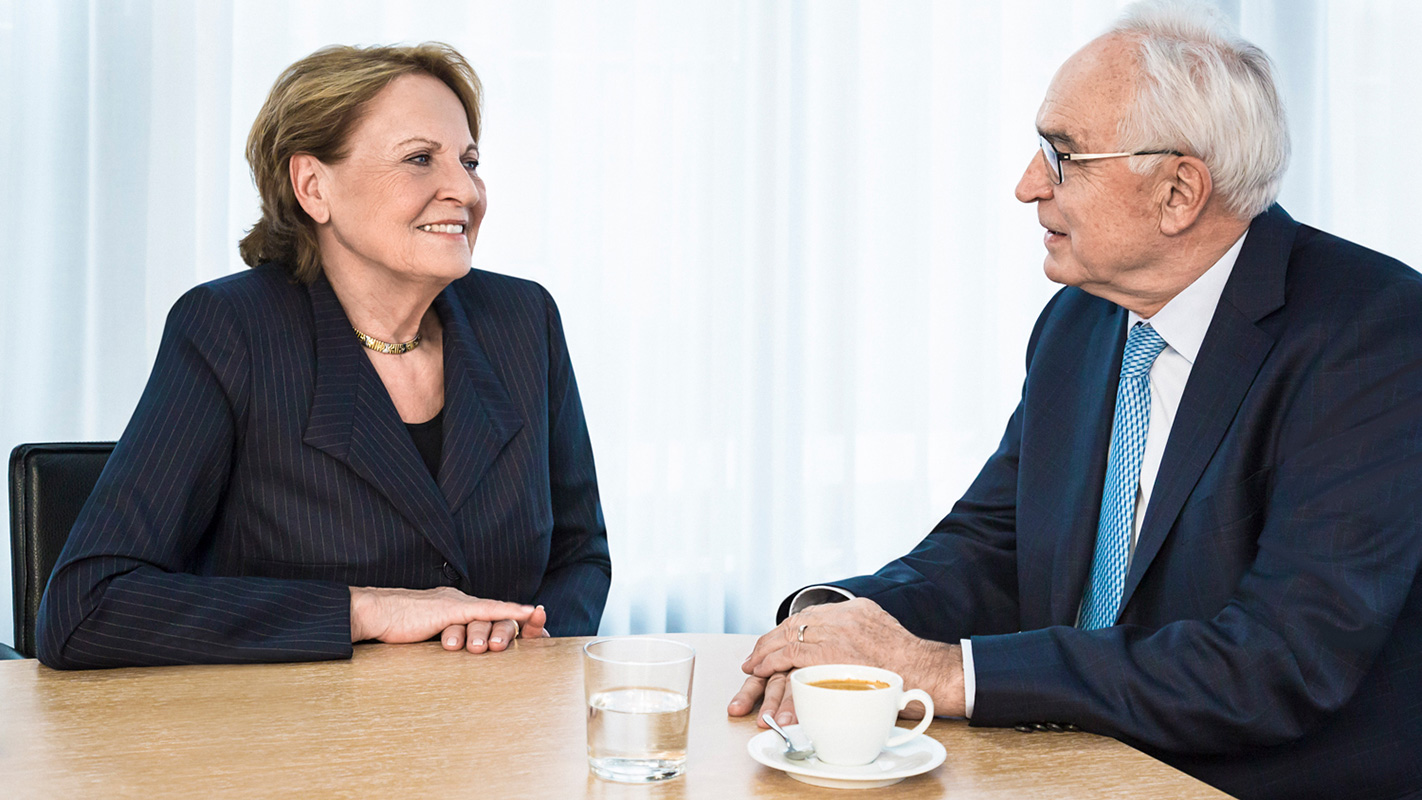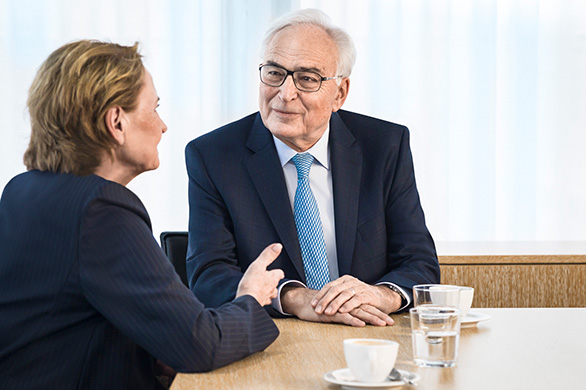
Mrs Liebherr, Mr Liebherr, the Group achieved record sales of over € 10,551 million in 2018. What do you think is driving this growth?
Willi Liebherr: We have benefited from a period of sustained growth in the global economy which has resulted in positive growth in nearly all our product divisions. Earthmoving, Mobile Cranes and Mining have performed particularly well over this period.
Isolde Liebherr: In terms of global market performance, a renewed upturn in growth in Europe was very pleasing. Our operations in countries such as Germany, France and the UK are performing very well. Other key drivers of growth are the markets in Asia and Oceania, specifically China and Australia. We are focusing on supporting growth in our core markets in a targeted way. For example, two years ago we bundled the Group’s activities in the US into a sales and service company and we are in the process of significantly expanding our operations in Newport News. We are also putting appropriate measures in place in China. For example, our new China headquarters is set to open in Shanghai in the next two years.
What were your personal highlights from the previous financial year?
Isolde Liebherr: A highlight for me was the opening of our new production facility for household appliances in Aurangabad (India) which is giving our company access to another key fast-growing market. The customer days at the Liebherr factory in Ehingen (Germany) were also particularly noteworthy. Two new types of cranes and an impressive crane structure were on show which symbolised our motto “Strongly connected”. Another highlight in our hotel business was the reopening of The Dunloe Hotel in Ireland. In the last year and half, we have refurbished the restaurant, bar, reception, lobby and lounge, and we have also re-landscaped the hotel’s gardens.
Willi Liebherr: It was pleasing to see the mining industry continue to recover so well in 2018. We have already touched on the fact that our Mining division has benefited a great deal from these favourable market conditions and has raised its sales revenues significantly. A particular high point for our Components division was starting serial production of our new D98 diesel engines which were delivered to our North American distributor for the first time. The engines are being installed in industrial generators. Another highlight for me was taking over the operations of a crane distributor in Australia and New Zealand. This acquisition is another step towards realising our internationalisation strategy for the Tower Crane division. Another point worthy of mention is that we have started delivering telescopic handlers and wheel loaders to a partner in the agricultural industry. This sales partnership will enable us to tap potential market opportunities.
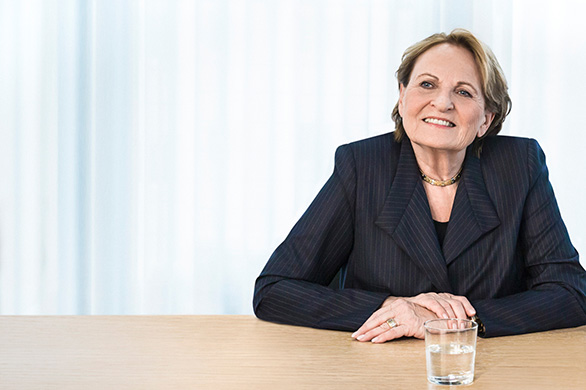
Operating results did not improve significantly compared with the previous year. How do you view this development?
Isolde Liebherr: This year’s operating profit was in line with our expectations. We have made a number of new investments recently which will only pay dividends and be reflected in higher operating profits over the next few years. We are always focusing on long-term success and not on a snapshot in time. The opening of a new production facility in India is a prime example of this type of investment.
Innovation plays a key role in a company’s success. How do you think the Group has performed in this respect?
Willi Liebherr: Our name is synonymous with cutting-edge technology which offers our customers genuine added value. And this will remain the case. For example, we are continually conducting research in partnership with various institutes and universities. Our innovative strength is also based on our extremely diverse product range. We have amassed a wealth of knowledge from a wide range of industries which we use systematically across all sectors. We also retain control of the key technologies for our products and are able to develop tailor-made solutions to meet extremely complex requirements. We have obviously identified certain megatrends, such as connectivity, mobility and urbanisation, and we are working on solutions covering a wide range of subjects related to these areas, whether it be autonomous driving, the Internet of Things or 3D printing to name just a few. To put it plainly: I think that we possess enormous innovative strength and great potential for the future.
Isolde Liebherr: My brother has just mentioned the partnerships we have forged with universities in the areas of research and development. We created a new central department last year which coordinates research and development projects across the entire Group. We want to encourage our divisions to share knowledge and ideas about the latest technologies and to achieve synergies. Special attention is being paid to the subject of digitisation. Huge amounts of resources are needed to manage the digital transformation process. As we are a broad-based Group of companies, we are fortunate that we can share the burden among our various businesses.
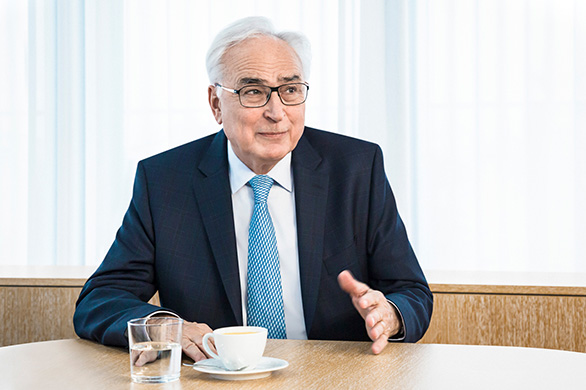
Types of mobility are set to change dramatically whether travelling by road, rail or air. Can you explain this in more specific terms? How is Liebherr helping to shape these developments?
Willi Liebherr: Tomorrow’s mobility will be more efficient, more autonomous and environmentally friendlier. As a leading systems supplier for the aviation and rail industries, we are systematically working on solutions which will meet these huge technological challenges. For example, we are taking part in the “More Electric Aircraft” research project and developing electric components and systems for aircraft which will be more efficient, reduce weight and subsequently lower fuel consumption. We are also making rail travel more environmentally friendly with our more efficient air cycle air-conditioning system. Furthermore, we are pressing ahead with our electric vehicle designs by developing turbo compressors for fuel-cell-powered vehicles. We are drawing on tried and tested knowledge we have gained from working in the aviation industry.
You have mentioned the Aerospace and Transportation Systems division. How much do alternative drive systems play a role in other divisions?
Isolde Liebherr: We are focusing on alternative drive systems in virtually all of our divisions. For example, during the previous financial year we launched the LPS 420 E, the first purely electric harbour crane. Electric drives are also becoming more important in construction machinery, especially in smaller machines which are used in city centres.
Willi Liebherr: As is the case in the automotive industry, the main challenge posed by electrification in all of these applications is battery performance. Consequently, we won’t be able to do without diesel any time soon due to its high energy density. This is why hybrid solutions, such as diesel-electric drives, will continue to play an important role. In addition to this and the electric drives, we are developing the first prototypes of combustion engines which are powered by a special carburettor fuel system using hydrogen.
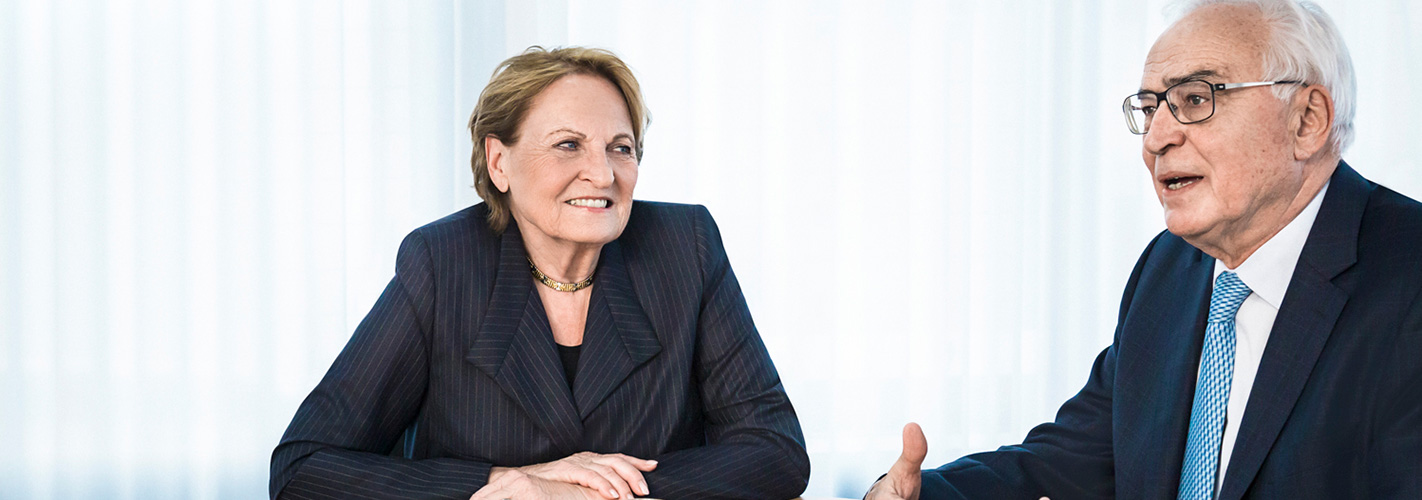
2019 is Bauma Year. Will these types of concept play a role here and is Liebherr well prepared for this international trade fair?
Willi Liebherr: We will once again have a presence in Munich and will be presenting numerous innovations – not only technological highlights of today but also cutting-edge solutions of tomorrow. These include the ETM series of electric-powered truck mixers and the electric-powered LH 26 M and LH 110 C Gantry Port material handling machines. We are also showcasing a new tower cranes series with fibre rope and the new XPower large wheel loader with a comprehensive package of intelligent assistance systems. We are well prepared and are looking forward to engaging directly with customers, partners, machine operators and interested parties. This is the only way to shape the future together.
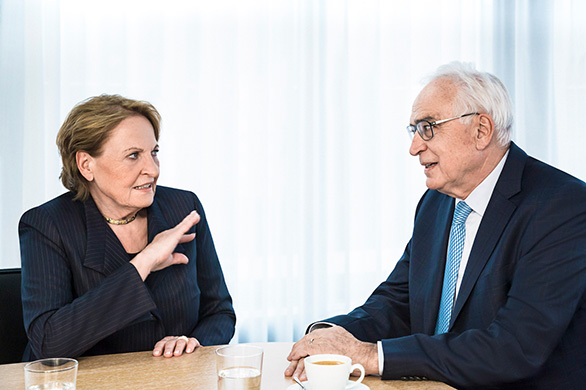
Bauma is a good indicator of the mood in the construction industry. Growth in 2018 was slower in Europe compared with the previous year and similar levels of growth are expected this year. What sorts of challenges does this present for Liebherr?
Willi Liebherr: I am not worried about weaker growth. Capacity utilisation in the European construction sector remains high and this is likely to be reflected at Bauma. Furthermore, we operate all over the world, even if Europe is our most important sales region. But much more importantly, we have always withstood periods of economic slowdown in the past and even managed to increase market share in some instances. This is because, in times like these, customers focus even more intently on the quality of the products. It also demonstrates that we can remain competitive even if growth were to slow down.
What are you especially looking forward to in the current financial year?
Isolde Liebherr: As I mentioned earlier, Bauma is going to be the highlight of 2019. I am also eagerly anticipating the opening of our new Household Appliances customer service centre in Ochsenhausen (Germany). Another milestone will be the delivery of the HLC 295000, the biggest crane we have ever developed. It is going to be used to install wind farms, in the oil and gas industries and to dismantle offshore facilities.
Willi Liebherr: I feel very optimistic about the months that lie ahead given our current healthy order book and I am looking forward to a generally successful year of business. The maiden flight of Boeing’s 777X is expected to be a particularly important highlight. This is because the world’s largest twinjet will include Liebherr technology: a powerful fold subsystem which can fold the wing tips upwards after landing. This is another example of how we are able to continue driving forward technological developments.

